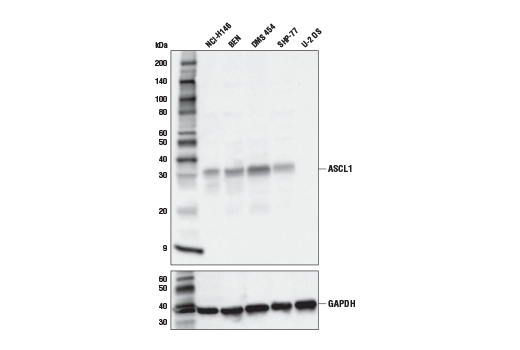
产品介绍
产品信息
抗原名称
ASCL1

来源纯化
Monoclonal antibody is produced by immunizing animals with a synthetic peptide corresponding to residues surrounding Phe108 of human ASCL1 protein.

宿主
Rabbit

简单描述
Monoclonal Antibody for studying ASCL1. Cited in 2 publications. Validated for WB, IP, ChIP. Highly specific and rigorously validated in-house, ASCL1 (E7N9C) Rabbit Monoclonal Antibody (CST #43666) is ready to ship.

商品描述
Product Usage Information
For optimal ChIP results, use 10 μl of antibody and 10 μg of chromatin (approximately 4 × 106 cells) per IP. This antibody has been validated using SimpleChIP® Enzymatic Chromatin IP Kits.
| Application | Dilution |
|---|---|
| Western Blotting | 1:1000 |
| Immunoprecipitation | 1:50 |
| Chromatin IP | 1:50 |

分子量
30

研究领域
癌症,发育生物学与干细胞研究,神经科学

应用
反应种属
Human

目标/特异性
Specificity/Sensitivity
ASCL1 (E7N9C) Rabbit mAb recognizes endogenous levels of total ASCL1 protein.
Species Reactivity:
Human

敏感性
Endogenous

背景
背景
Achaete-scute homolog 1 (ASCL1), also known as MASH-1, is a basic helix-loop-helix (BHLH) transcription factor which plays an essential role in the differentiation of neuroendocrine cells and neural tissues (1-3). ASCL1 directly binds the E-box motif (5'-CANNTG-3') on promoters, with dimerization with other BHLH proteins required for efficient DNA binding (4). Acting as a pioneer transcription factor, ASCL1 also accesses closed chromatin, allowing other factors to promote transcription of neuronal genes and activate neural pathways (5). Research studies have shown that knockdown of the ASCL1 gene leads to inhibition of growth and induction of apoptosis in SCLC cells in vitro (6). Additionally, ASCL1 is overexpressed in both classic SCLC as well as NSCLC with neuroendocrine features, suggesting its role in the pathogenesis of those malignancies (7). ASCL1 plays a crucial role in promoting SCLC carcinogenesis by upregulating the expression of DLL3, a nonfunctioning Notch ligand, leading to inhibition of the Notch signaling pathway (8).
1.Ball, D.W. et al. (1993) Proc Natl Acad Sci U S A 90, 5648-52.
2.Cau, E. et al. (1997) Development 124, 1611-21.
3.Borges, M. et al. (1997) Nature 386, 852-5.
4.Henke, R.M. et al. (2009) Dev Biol 328, 529-40.
5.Wapinski, O.L. et al. (2013) Cell 155, 621-35.
6.Jiang, T. et al. (2009) Cancer Res 69, 845-54.
7.Augustyn, A. et al. (2014) Proc Natl Acad Sci U S A 111, 14788-93.
8.Borromeo, M.D. et al. (2016) Cell Rep 16, 1259-72.

研究领域
癌症,发育生物学与干细胞研究,神经科学
翻译后修饰
Unmodified

制备和贮存
保存方式
Supplied in 10 mM sodium HEPES (pH 7.5), 150 mM NaCl, 100 µg/ml BSA, 50% glycerol and less than 0.02% sodium azide. Store at –20°C. Do not aliquot the antibody.
数据库链接
Entrez-Gene ID
429

UniProt ID
P50553

声明 :本官网所有报价均为常温或者蓝冰运输价格,如有产品需要干冰运输,需另外加收干冰运输费。








 用小程序,查商品更便捷
用小程序,查商品更便捷







 危险品化学品经营许可证(不带存储) 许可证编号:沪(杨)应急管危经许[2022]202944(QY)
危险品化学品经营许可证(不带存储) 许可证编号:沪(杨)应急管危经许[2022]202944(QY)  营业执照(三证合一)
营业执照(三证合一)